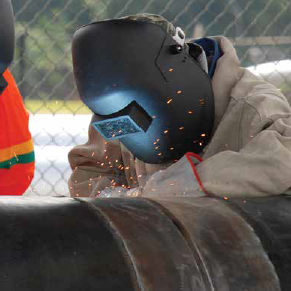ABOUT WELDING COORDINATORS
Welding coordinators are integral people in the field of welding, playing pivotal roles in ensuring the quality, safety, and efficiency of welding operations. These professionals are essential for organisations and projects of all sizes, as they oversee and manage various aspects of welding activities. At the Southern African Institute of Welding (SAIW), we recognise the significance of these roles and offer specialised training programmes to equip individuals with the knowledge and skills necessary for their success.
Welding coordinators are responsible for orchestrating and managing welding operations at a higher level. They ensure that welding activities adhere to international standards and codes, coordinate multiple projects or departments, and oversee the certification of welders and welding procedures. Through SAIW’s courses, such as those aligned with the International Institute of Welding’s (IIW) Qualifications, individuals can become proficient Practitioners (IWP), Specialists (IWS), or Technologists (IWT), depending on their career goals and the scope of their responsibilities. These qualifications provide a structured pathway for welding professionals to advance their careers and make significant contributions to their organisations.
By choosing SAIW as your training partner, you gain access to a wealth of expertise and resources in the field of welding coordination. Our programmes are designed to meet the industry’s evolving demands. Our experienced instructors are committed to providing comprehensive training that aligns with international best practices.
Join us at SAIW and embark on a journey to become a respected and capable leader in the world of welding coordination. Your skills and expertise will contribute to the safety and excellence of welding operations across various industries.
Career Progression
The IIW’s IWP, IWS, and IWT courses provide a structured pathway for individuals to acquire the knowledge and skills needed to excel in welding coordination roles. These courses offer a progressive curriculum, allowing students to advance from the practitioner level (IWP) to specialist (IWS) and technologist (IWT) levels, depending on their career aspirations and responsibilities. These qualifications can lead to career growth and increased expertise in welding coordination within the welding industry.



